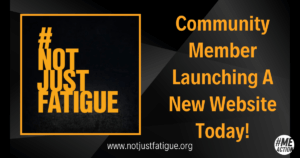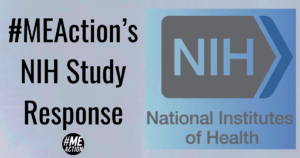Members of Parliament heard about the flaws of the PACE Trial – and its devastating effects on people with Myalgic Encephalomyelitis (ME) – in a Westminster Hall debate today. Twenty-six MPs attended the debate.
The PACE trial claimed that exercise can improve people with ME through graded exercise therapy (GET) and cognitive behaviour therapy, forming a pervasive perception of ME as a psychological disease in the UK and throughout the world.
“When the full details of the trial become known this will become known as one of the biggest medical scandals of the 21st century,” tweeted Member of Parliament, Carol Monaghan, who secured the debate and spoke about the trial before the members of parliament.
After her speech, Nicky Morgan suggested bringing the issue before the House of Commons for a longer debate.
“After a decade of silence in the House of Commons, it was incredible to hear numerous MP’s put on record how bad science has let down so many people with Myalgic Encephalomyelitis,” said #MEAction activist, Sarah Reed. “But a decade of silence can’t be made up in 30 minutes.”
Unusually, the Department for Work and Pensions contributed to the £5m, publicly funded research study. (PACE is short for “Pacing, graded Activity, and Cognitive behaviour therapy; a randomised Evaluation”). Monaghan questioned whether the DWP had funded the trial as a way of removing people from long-term benefits and reducing the welfare bill.
Monaghan pointed to conflicts of interest in the trial.
“The former chief medical adviser to the DWP sat on the trial’s steering committee, and ultimately the results of the trial have been used to penalise those with ME,” Monaghan said.
“When we consider the relationship between key PACE investigators and major health insurance companies such as Unum, the trial takes on a far more sinister slant. Sufferers have reported that their health insurance company would pay out only if they undertook a program of GET—an impossible task, as the insurance giants knew.”
(The Minister, Caroline Dinenage, pointed out that these conflicts “were published with the trial protocol as well with the results,” although Monaghan said these conflicts were not disclosed to the PACE participants.)
More than 1,000 people had contacted Monaghan prior to the debate to express their concerns about the PACE trial or report experiences of being harmed after trying to push themselves in a gradually intense exercise regiment as prescribed by GET.
The trial relied on subjective self-reporting from patients – there were no physiological measurements. Monaghan described the experience of one participant.
“After repeatedly being asked how severe…my symptoms were—in the context of…it’s just me not trying hard enough…I started to feel like I had to put a…positive spin on my…answers. I could not be honest about just how bad it was, as that would…tell the doctors I wasn’t trying and I wasn’t being positive enough. When I was completing questionnaires…I remember second guessing myself and thinking for every answer: ‘Is it really that bad? Am I just not looking at things positively enough?’”
“When the results were not as expected, rather than revise the original hypothesis, the investigators simply changed the success criteria,” Monaghan explained. “Thus patients participating in GET who had deteriorated during the study were considered recovered.”
“Calls to publish the raw data—basic protocol in good research—were ignored,” Monaghan told Members of Parliament. ” Queen Mary University spent an estimated £200,000 on keeping the data hidden.
“Finally, after a long battle, patients won a court order to force the PACE authors to release the data. It was discovered that the authors had altered the way in which they measured improvement and recovery, to increase the apparent benefit of the therapies. Re-analysis showed that the improvement rate fell from 60% to 21% and the recovery rate fell from 22% to just 7%.”
Going forward
Monaghan finished her speech by asking the Minister:
- Can the next set of guidelines be drawn up through listening to those living with ME?
- What plans does she have to introduce compulsory training for medical practitioners on ME care and treatment?
- Can she assure me that specialist ME treatment centres are not advertising graded exercise therapy as a method of recovery?
- Will she support proper funding for ME research?
- Will she work with DWP colleagues to ensure that new guidelines are drawn up for dealing with people with ME?
The Minister of Care, Caroline Dinenage, responded:
“In recognising the need for GPs to be aware of the condition, the Royal College of General Practitioners identified CFS/ME as a key area of technical knowledge that GPs should have as part of their qualifying exams.”
Ripple effects from the PACE Trial
The PACE trial has informed the medical guidelines on ME in the UK, issued by the National Institute for Health and Care Excellence (NICE). Patient advocates were recently successful in lobbying NICE to agree to review its guidelines for ME, which had recommended GET and CBT as courses of treatment. A decision on the NICE guidelines is not expected until October 2020.
Actions your MP can take right now!
Follow-up with your MP following the Westminster Hall debate, and suggest that they take the following actions right away:
- Your MP can act now by signing the EDM (271) NICE Guideline on ME that removes graded exercise therapy (GET) and Cognitive Behavioural Therapy (CBT) from the NICE guidelines on ME.
- Encourage your MP to watch the award-winning ME documentary, Unrest, that was shown in the House of Commons, available on Netflix.
Keep connecting with your MP – a note from #MEAction activists:
#MEAction will be following up today’s debate with the 180+ MP’s known to us. However, MP’s respond best to their own constituents. Thank you to everyone who has made contact with their MP over the last few months. We realise that this comes at a cost to health but it has made a real difference. Through sharing your experiences, alongside the showing of Unrest in parliament, MP’s are starting to understand the personal loss and we are gaining their interest and attention. As we’ve seen today they are wanting to speak up for us.
If your MP attended the debate, or especially if they made an intervention – thank them.
If they didn’t attend, please ask them to look it up in Hansard or share this link.
We are already in the process of planning a bigger debate in the near future and are working alongside other ME charities to make sure we make the best impact possible. There certainly seems enough interest to make this bigger. Unfortunately parliament works at a faster pace than most of us with ME! If we are successful in securing a debate we might only get a weeks notice to prepare, so if you’ve not already contacted your MP why not prepare your story to add to the weight of others? We will let you know when is the best time to send it.
There’s a lot more that needs to come to light and be unpacked further but it’s been a great day of hope and optimism for people with ME. Change comes slowly, but we hope this is just the launch pad of many more to come!
MP’s that made interventions:
Nicky Morgan (Con)
Jim Shannon (DUP)
Jim Cunningham (Lab)
Alex Sobel (Lab)
Rachael Maskell (Lab)
John Howell (Con)
John Lamont (Con)
Helen Whately (Con)
Layla Moran (LD)
Alison Thewliss (SNP)
Luke Graham (Con) Attempted intervention
Luke Pollard (Lab)
Paul Bloomfield (Lab)
Learn more
Read the Parliamentary briefing about the PACE trial here.
Read more about Parliamentary Early Day Motion 271 here.
Read more about the PACE trial here.
Read an article about the politics of ME in the UK here.






1 thought on “PACE Trial 'medical scandal' Sparks UK Parliament Debate”
Small point: it’s not correct to say that the Department of Work and Pensions gave £2 milliontowards the trial. I presume this was calculated by subtracting £3,000,000 that was reported to be from the Medical Research Council from the total cost of £5,000,000. However that excludes the money from Chief Scientist Office (CSO) in Scotland and the Department of Health (see below)
—-
From figures below:
£2,076,363
£1,800,600
£702,975
£250,000
——
£4,829,938 + DWP money (unknown)
(Yes this is the same web page but it is a summary of a different entry)
http://tinyurl.com/ydsv857
i.e.
http://www.rae.ac.uk/submissions/ra5a.aspx?id=176&type=hei&subid=3181
You are in: Submissions > Select institution > Queen Mary, University of
London > UOA 9 – Psychiatry, Neuroscience and Clinical Psychology > RA5a Queen
Mary, University of LondonUOA 9 – Psychiatry, Neuroscience and Clinical
Psychology
RA5a: Research environment and esteem
[..]
White showed that recovery from CFS is possible following CBT (Knoop et al,
2007). The MRC funded PACE trial, led by White , evaluates CBT, graded
exercise, adaptive pacing and usual medical care in the treatment of CFS, and
is over half-way completed (http://www.pacetrial.org/) (PACE trial MRC
04-09 £2,076,363, DH Central Subvention 04-09 £1,800,600; MRC PACE trial
extension 09-10 £702,975).
=========
==================
SCOTTISH PARLIAMENT – WRITTEN ANSWER
2 December 2005
Health Department
Janis Hughes (Glasgow Rutherglen) (Lab): To ask the Scottish Executive what
funding it has awarded for chronic fatigue syndrome/myalgic encephalomyelitis
(CFS/ME) services or research since the CFS/ME short-life working group
reported in 2002.
(S2W-20924)
Lewis Macdonald:
NHS Boards are given unified budgets, increased by an average of 7.6% in the
current financial year, from which they are expected to meet the costs of
services for people with CFS/ME and all other chronic conditions. It is for
NHS Boards to decide how their unified budgets should be distributed, based on
their assessments of local needs.
The Chief Scientist Office (CSO), within the Scottish Executive Health
Department, has responsibility for encouraging and supporting research into
health and health care needs in Scotland. CSO is currently contributing
£250,000 to the Medical Research Council project ‘Pacing, Activity and
Cognitive behaviour therapy: a randomised Evaluation (PACE)’ which compares
different approaches to the clinical management of patients with CFS/ME.
Comments are closed.